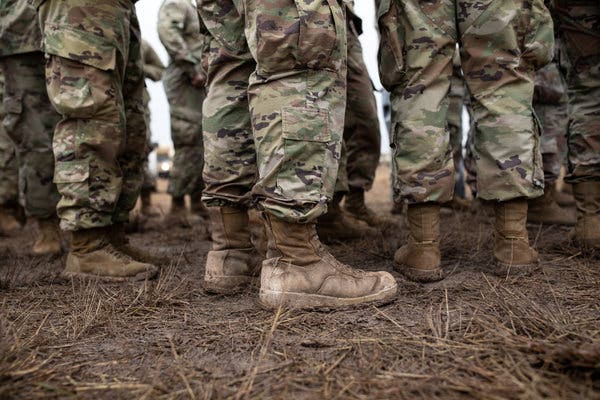Is Trump's Transgender Military Ban Fair? Examining The Arguments

Table of Contents
Arguments Against the Transgender Military Ban
Opponents of the ban raise several critical concerns, focusing on human rights, military effectiveness, and financial implications.
Discrimination and Human Rights Violations
The core argument against the ban centers on its discriminatory nature. It violates the fundamental human rights of transgender individuals, denying them equal opportunity to serve their country based solely on their gender identity. This contradicts principles of equality and inclusion, essential for a modern and effective military.
- Legal Arguments: The ban has faced significant legal challenges, with lawsuits arguing it violates the Equal Protection Clause of the Fourteenth Amendment. Several court cases have addressed the legality and fairness of the ban, highlighting the ongoing legal battle surrounding this policy.
- Impact on Morale and Recruitment: The ban negatively impacts military morale by creating a climate of exclusion and discrimination. It also hinders recruitment efforts by deterring qualified transgender individuals from considering a military career. This loss of potential talent weakens the overall strength of the armed forces.
- Human Rights Legislation: The ban clashes with international human rights standards that protect against discrimination based on gender identity. International pressure and criticism have been levied against the policy.
Military Readiness and Effectiveness
Excluding transgender individuals reduces military readiness and effectiveness. The ban prevents the military from benefiting from the skills, experience, and dedication of qualified transgender personnel.
- Loss of Potential Talent: The ban results in the loss of potential talent and expertise. Many transgender individuals possess the skills and dedication necessary for successful military service. Their exclusion weakens the military's overall capabilities.
- Cost of Retraining and Replacing Personnel: Discharging qualified transgender service members necessitates retraining and replacing them, incurring significant costs for the military. These resources could be better used to enhance other areas of military readiness.
- Diversity and Inclusion: A diverse and inclusive military is a stronger military. The exclusion of transgender individuals undermines this principle, limiting the military's ability to effectively represent and serve the diverse population of the nation.
Financial Burden
The ban places a considerable financial burden on taxpayers. The costs associated with discharging transgender service members are substantial.
- Discharge Costs: These costs include severance pay, healthcare expenses, and potential legal fees resulting from lawsuits challenging the ban.
- Lost Investment: The military invests significant resources in training and developing its personnel. Discharging transgender service members represents a loss of this investment.
- Healthcare Costs: While some argue that gender-affirming care is expensive, it's often cheaper than long-term treatment for gender dysphoria. The overall cost-benefit analysis may favor retaining qualified personnel over discharging them.
Arguments in Favor of the Transgender Military Ban
Proponents of the ban argue that it protects military readiness, controls costs, and maintains established standards. It's crucial to understand these arguments, even if they are ultimately unconvincing.
Military Readiness and Unit Cohesion
Supporters claim that the ban maintains unit cohesion and avoids potential disruptions caused by integrating transgender individuals.
- Integration Challenges: This argument focuses on the perceived challenges of integrating transgender individuals into existing units, particularly concerning bathroom access, privacy, and potential impact on unit morale. These are concerns that need addressing but not necessarily through a blanket ban.
- Accommodation Costs: While not explicitly stated, the underlying concern here is the perceived additional cost and logistical challenges of accommodating transgender individuals.
- Maintaining Tradition: Some argue that the military's traditional standards should be maintained, suggesting that any changes would be disruptive.
Cost of Healthcare and Transition-Related Expenses
Proponents emphasize the substantial costs associated with providing gender-affirming healthcare to transgender service members.
- Expense of Medical Treatments: This includes hormone therapy, surgeries, and other medical treatments, which can be expensive. This is a valid concern, but it needs to be weighed against the potential cost-savings of retaining qualified personnel.
- Budgetary Considerations: The argument frames this as a matter of budgetary priorities and resource allocation within the military.
- Uncertain Long-Term Costs: There's a lack of definitive data on the long-term costs of providing gender-affirming care versus the cost of losing talented service members.
Standards and Regulations
The ban, according to its supporters, upholds existing military standards and regulations, ensuring a consistent and clear framework for service members.
- Clear and Consistent Standards: This argument stresses the need for established standards within the armed forces to maintain order and discipline.
- Comprehensive Review Process: Any changes to these standards, they argue, require a thorough and cautious review process to avoid unintended consequences.
- Maintaining Order and Discipline: The underlying concern is maintaining order and discipline within the military, implying that integrating transgender individuals would somehow disrupt this.
Conclusion
The debate surrounding the transgender military ban is complex and multifaceted, involving human rights, military readiness, and significant financial implications. Both sides present compelling arguments, highlighting the deeply divisive nature of this issue. The arguments against the ban strongly emphasize the discriminatory nature of the policy and its negative impact on military effectiveness. While proponents raise concerns about costs and maintaining standards, these concerns do not justify discriminatory practices.
Understanding the various perspectives on the transgender military ban is crucial for informed discussion. Continue to research and engage with the topic to form your own opinion on this important issue. Further research into the long-term effects of the transgender military ban, including its impact on recruitment, retention, and military readiness, is essential for a complete understanding of this complex policy.

Featured Posts
-
 Sensex Today Live Stock Market Updates 100 Points Higher Nifty Above 17950
May 10, 2025
Sensex Today Live Stock Market Updates 100 Points Higher Nifty Above 17950
May 10, 2025 -
 Bert Kreischers Netflix Stand Up The Impact On His Marriage
May 10, 2025
Bert Kreischers Netflix Stand Up The Impact On His Marriage
May 10, 2025 -
 To Buy Or Not To Buy Palantir Stock Weighing The 40 2025 Prediction
May 10, 2025
To Buy Or Not To Buy Palantir Stock Weighing The 40 2025 Prediction
May 10, 2025 -
 Attorney Generals Fentanyl Display A Closer Look
May 10, 2025
Attorney Generals Fentanyl Display A Closer Look
May 10, 2025 -
 Stiven King Gostri Slova Pro Trampa I Maska
May 10, 2025
Stiven King Gostri Slova Pro Trampa I Maska
May 10, 2025
